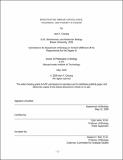Investigating immune surveillance, tolerance, and therapy in cancer
Author(s)
Cheung, Ann F
DownloadFull printable version (8.686Mb)
Other Contributors
Massachusetts Institute of Technology. Dept. of Biology.
Advisor
Tyler Jacks.
Terms of use
Metadata
Show full item recordAbstract
Maximizing the potential of cancer immunotherapy requires model systems that closely recapitulate human disease to study T cell responses to tumor antigens and to test immune therapeutic strategies. Current model systems largely relied on chemically-induced and spontaneous tumors in immunodeficient mice or on transplanted tumors. Such systems are limited because they fail to reproduce the complex interactions that exist among an emerging tumor, its microenvironment and the multiple elements of an intact immune system. We created a new system that is compatible with Cre-loxP-regulatable mouse cancer models in which the defined antigen SIY is specifically over-expressed in tumors, mimicking clinically-relevant tumor-associated antigens. To demonstrate the utility of this system, we characterized SIYreactive T cells in the context of lung adenocarcinoma, revealing multiple levels of antigenspecific T cell tolerance that serve to limit an effective anti-tumor response. Thymic deletion reduced the number of SIY-reactive T cells present in the animals. When potentially self-reactive T cells in the periphery were activated, they were efficiently eliminated. Inhibition of apoptosis resulted in more persistent self-reactive T cells, but these cells became anergic to antigen stimulation. Finally, in the presence of tumors over- expressing SIY, SIY-specific T cells required a higher level of costimulation to achieve functional activation. (cont.) Adoptive cell transfer (ACT) therapy for cancer has demonstrated tremendous efficacy in clinical trials, particularly for the treatment of metastatic melanoma. There is great potential in broadening the application of ACT to treat other cancer types, but the threat of severe autoimmunity may limit its use. Studies in other model systems have demonstrated successful induction of anti-tumor immunity against self-antigens without detrimental autoimmunity. This is possibly due to the preferential recognition of tumor over normal somatic tissue by activated T cells. In our system, SIY provides a means to achieve this bias because of its over-expression in tumors. Thus, we applied adoptive T cell transfer therapy combined with lymphodepleting preconditioning to treat autochthonous lung tumors over-expressing SIY self-antigen. With this treatment, we overcame peripheral tolerance, successfully inducing large number of functional anti-tumor T cells. These T cells are able to influence lung tumors over-expressing self-antigen. Importantly, despite large numbers of potentially self-reactive T cells, we did not observed overt autoimmunity. Immune tolerance thwarts efforts to utilize immune therapy against cancer. We have discerned many mechanisms by which tolerance to cancer in potential achieved. Both Foxp3+ T regulatory cell and myeloid-derived suppressor cell populations are expanded in the presence of cancer in our mouse models. (cont.) In addition, we identified LAG-3 as a potential factor that serves to limit anti-tumor T cell activity in the context of adoptive cell transfer therapy. Our new system represents a valuable tool in which to explore the mechanisms that contribute to T cell tolerance to cancer and to evaluate therapies aimed at overcoming this tolerance. In addition, our model provides a platform, on which more advanced mouse models of human cancer can be generated for cancer immunology.
Description
Thesis (Ph. D.)--Massachusetts Institute of Technology, Dept. of Biology, 2009. This electronic version was submitted by the student author. The certified thesis is available in the Institute Archives and Special Collections. Vita. Includes bibliographical references.
Date issued
2009Department
Massachusetts Institute of Technology. Department of BiologyPublisher
Massachusetts Institute of Technology
Keywords
Biology.